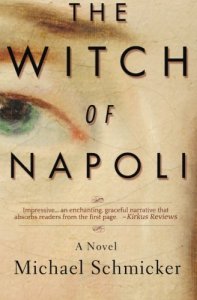 Michael Schmicker draws on all his gifts as a journalist, student of the paranormal, and storyteller to make The Witch of Napoli—a novel about a nineteenth-century Italian medium named Alessandra Poverelli—captivating and compelling. I read it quickly, in three nights, and then started to read it again, savoring the story—and admiring Schmicker’s skill—more the second time.
Michael Schmicker draws on all his gifts as a journalist, student of the paranormal, and storyteller to make The Witch of Napoli—a novel about a nineteenth-century Italian medium named Alessandra Poverelli—captivating and compelling. I read it quickly, in three nights, and then started to read it again, savoring the story—and admiring Schmicker’s skill—more the second time.
Many women who emerge from tragic circumstances and try to remake themselves to meet the challenges of the present will identify with Alessandra. Though such women develop considerable strengths, they may remain vulnerable, and their weaknesses may leave them open to manipulation or exploitation. Alessandra has not only a strong will and a survivor’s temperament but also complicated passions and deep conflicts. She has her own dead, her own ghosts to contend with: her mother died of a terminal illness; and her father, a supporter of Garibaldi, was executed for treason. Alessandra endures other traumatic losses, and we see that her suffering is a major source of the energy that connects her to the spiritual realm.
Narrating her story is Tomaso Labella, a prominent newspaper editor whom Alessandra befriended when he was sixteen years old and a novice photographer. His memories of her and the experiences they had together are triggered by her death at age sixty. In the process of reading Labella’s account, we find our emotions being engaged and our loyalties starting to form. The backdrop to this account is a vigorously realized fin-de-siècle Europe: Schmicker recreates the sights and sounds of several large cities and weaves into the narrative various social, political, and scientific developments.
Under the guidance of Camillo Lombardi, a prominent doctor and university professor, Alessandra strives to prove she is a true medium. Two forces oppose her in this effort: the London Society for the Investigation of Mediums, whose principal investigator is Nigel Huxley; and the Catholic Church. Of the two, Huxley is the greater threat, and Schmicker pits a malevolent spirit against him. During the séances Alessandra conducts, spirits respond to her summons, and the most terrifying of them is Girolamo Savonarola, a fifteenth-century Dominican friar who was burned at the stake as a heretic. Huxley is ascetic in his personal life and devoted to his mission, but in every other way, he and Savonarola are opposites. The two meet twice, and Schmicker makes the second meeting a dramatic and violent encounter.
The reasons for Alessandra being the object of spiritual possession by Savonarola are not explained. A real historical figure, Savonarola attempted to purge his fellow Florentines of their sins, claiming to have visions and personal communications with the divine. Why this religious scourge and megalomaniac would be drawn to Alessandra, calling her his beloved, seems both paradoxical and plausible. In the emotionally charged world she dwells in much of the time, the clash between light and dark, good and evil is a kinetic force, destabilizing reality.
There are some confusing moments as Labella shifts between the past tense and the present tense, and I assume Schmicker was attempting to create the impression of a tale told in the immediate moment. Also, the relationship between Alessandra and Pigotti, her manager, is never clarified; sometimes he is portrayed as her lover and other times her husband, though in the book they never marry—and she never divorces her first husband.
At the end of The Witch of Napoli, we learn that the book is a fictionalized account of the true-life story of Eusapia Palladino (1854–1918). In an author’s note, Schmicker quotes the passages from letters, reports, articles, and books about Palladino that he incorporated into his text. In a few cases, how exactly this information was used is unclear, as Alessandra’s name appears in the extracts where we would expect Palladino’s. The name of the publisher of The Witch of Napoli is also Palladino, suggesting a link between the medium and the publisher. I therefore tried to find information about Palladino Books on the internet but couldn’t, and this generated another question about the book.
As an editor, I had other quibbles with The Witch of Napoli, but found the story powerful and absorbing nonetheless.